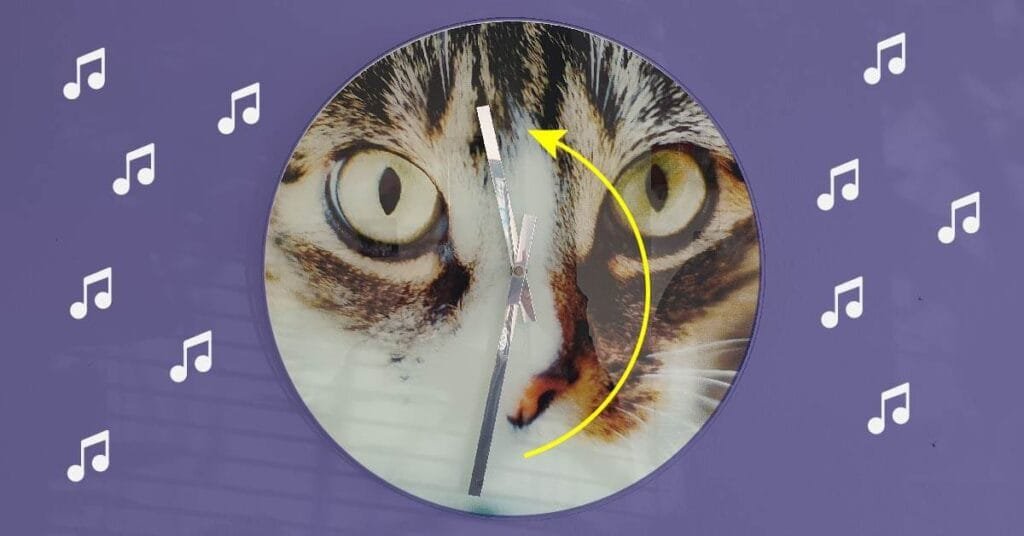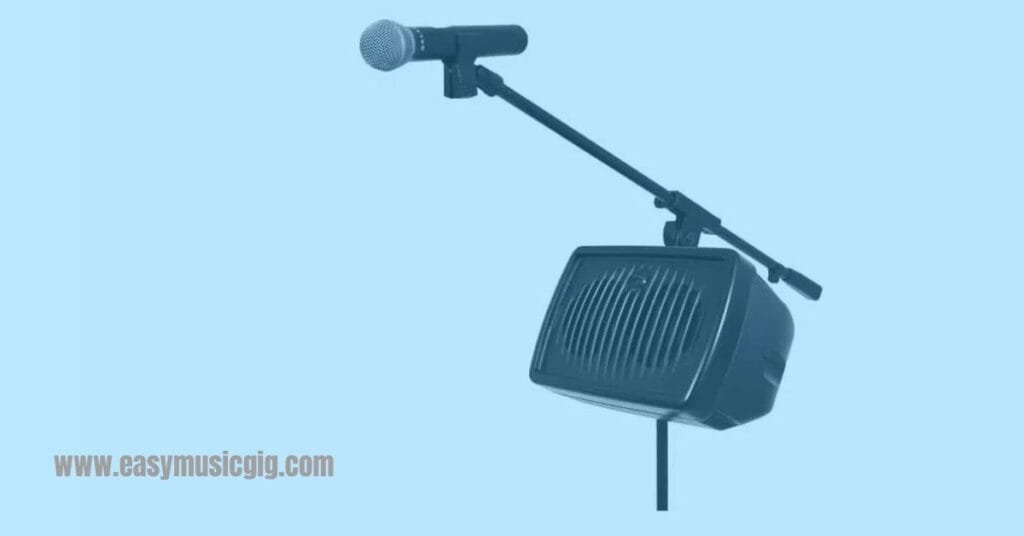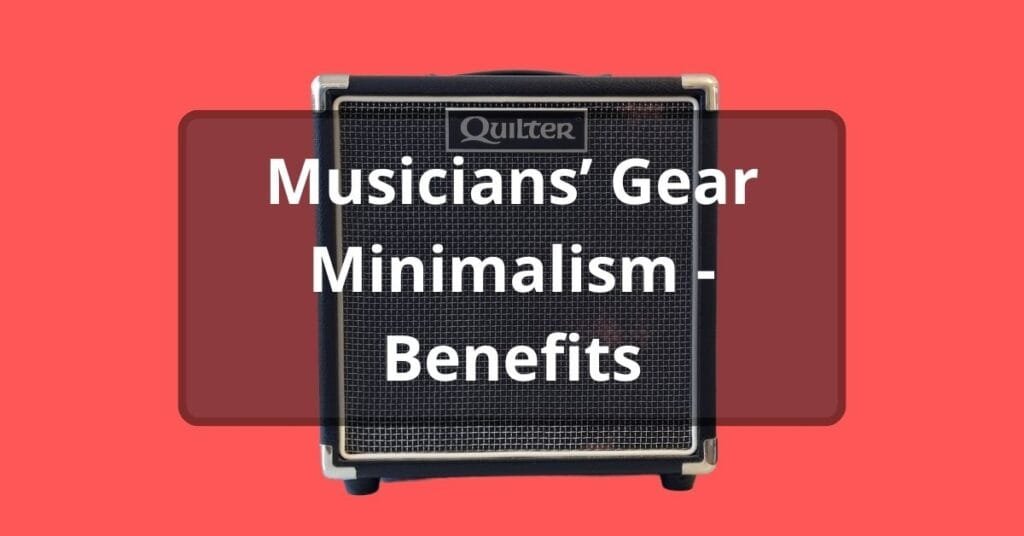The Complete Guide to Musical Duo Types for Gigging Musicians
Musicians who already have a career in live music or are just starting out often ignore the live musical duo as a concept. The live duo format offers one of the most flexible and profitable types of musical entertainment for gigging. The most common format of a duo band for events consists of a singer and a guitar player. But this is just the tip of the iceberg in the many variations a musical duo can operate.
In this guide, we will explore the most common types of musical duos for professional gigging. Weddings, bars, or corporate events all have specific needs when hiring a live duo act. Let us dive deeper into the pros and cons of each combination so you can choose the duo style that will work best for you.
Most popular types of musical duos
Generally, there are several groups of musical duo types with variations:
- Vocal + one instrument
- Two “standard“ instruments in popular music (guitar, bass, keys, sax,…) with or without vocals
- Classical and jazz instrumental music duos (cello, piano, violin, double bass,…)
- The “hybrid duo”: Electronic/DJ/loops + instrument (one person uses loops, backing tracks, or is a DJ, while another plays an instrument)
There are many variations on the groups of musical duos mentioned above. Still, in this article, we will focus on variations that are suitable for today’s pop-rock, R&B, jazz, and folk music styles. Classical music is something completely different and can be played with endless combinations of two instruments.
1. The vocal and acoustic guitar duo
This is for sure the most common type of musical duo around. There is something magical about the human voice accompanied by the natural sound of an acoustic guitar. The vocalist provides the melodic parts while singing lyrics, while the acoustic guitar gives us harmony and rhythm. A guitar player who can sing backing vocals is a big plus.

This combination is perfect for versatility across all genres. Playing the guitar in this type of a duet requires a different approach than when in a full band with a rhythm section. The playing should try to compensate or “mimic” some drum and bass parts for a memorable experience. On the other spectrum of arranging, the guitar can play the opposite: outlining the song in a more jazzy feeling. It all depends on your style, taste, and the specific type of gig you are playing. The louder, full strumming guitar playing may be ideal for a busy pub, but for a wedding reception, a quieter, but more complex arrangement is the way to go.
Pros:
- Minimal equipment makes setup and teardown extremely fast
- Easy to transport (instruments: just one guitar)
- Can be played unplugged
- Perfect for small venues with an intimate atmosphere (lower volume)
Cons:
- Not ideal for high-energy gigs or larger venues
- Limited sound compared to duos with percussion or bass guitar
Best for: Pubs, restaurants, small wedding ceremonies, and opening acts
Tips
- Add a stomp/drum box for energetic performances
- Using a looper in several songs can be very natural when not overdoing it
- For vibrant events, the use of an all-in-one machine like the TC Helicon VoiceLive3 Extreme can spice things up to the max (backing tracks, multi-channel looper, multieffects for guitar and vocal)
- Choosing only an electric guitar is not the best option. If you want to play a couple of songs on the electric guitar, you can create an interesting musical palette for the audience
2. The vocal and keys duo
This duo type is similar to the vocal and guitar duo. The keys, especially the piano sound, are capable of offering a more sophisticated vibe than the guitar on some occasions. When jazz and classical music are played, the vocal and piano musical duo is an excellent choice for intimate events and venues.
Pros:
- Modern keyboards can simulate full-band sounds
- A keyboard provides bass lines and melodic lines that fill the arrangement easily
- Excellent for covers of jazz, blues, and R&B standards
Cons:
- More gear involved: Keyboards are bulkier than guitars
- Keyboard playing requires good knowledge of arranging
Best for: Weddings, hotel lobbies, exclusive restaurants, corporate events, and cruise ships
3. The two-guitar duo
The two guitars can be both acoustic or one acoustic and one electric. I am a fan of two acoustic guitars for this type of duo act because they sound more natural than when an electric guitar is involved. If you choose to start a duo with two acoustic guitars, the best thing is to concentrate on simple arrangements. I have seen duos where both players sang and played the same thing. This is not something people will remember.
Pros & Cons:
- Basically the same as with the one vocal and one acoustic guitar duo
- The only difference is one more guitar
Best for: Pop/rock, blues, and country music.
4. The guitar and keys duo
When carefully prepared, a duo with a modern keyboard and a guitar can sound like a full band. The guitar is the missing part from the vocal and keys type of duo. This duo type takes the electric guitar very well due to all the electronic layerings going on. I know several duos who have played this way for a very long time. It all depends on the venues where you play. Places that require upscale music will benefit from a modern keyboard and electric guitar musical duo, while more intimate settings are better suited for a piano and acoustic guitar duo.
Pros:
- All music genres and arrangements can be played thanks to the modern all-in-one keyboard
- Good for larger events (Weddings, corporate events,…)
Cons:
- The setup and teardown time is longer than with other duo types
- Requires more gear
5. The guitar and bass duo
This is my favorite type of live music duo. We all know what an acoustic guitar can achieve, but when it’s combined with a bass guitar, we get all the missing low notes, additional rhythm, and a percussive touch. The sound that this combination can produce is much richer for playing all types of modern music.
The audience wants to hear songs they love; it’s as simple as that. They don’t care whether the song is played exactly how it is recorded, note by note, or not. Some soloing is OK if it is melodic and not too long. Playing long or frequent solos is acceptable in a duo format only if you are playing, i.e., blues on two acoustic guitars, and people know that is the style of music you are playing that night. In most situations, if you are outlining great songs, even if it’s in your own way, you are doing a good job.
Pros:
- Very easy to set up
- Versatile for many music styles and event types
- Much closer to a full band than two guitars
Cons:
- The bass needs a PA that can produce more low-end than when playing with only guitars
6. The Guitar and percussion duo
This combo is similar to a guitar and bass duo, but with emphasis on rhythm. A common choice for the percussive half of the band is the cajon, which is ideal for small, yet vibrant venues where a bit of extra punch is needed.
7. The Sax and DJ duo: club vibes in a duo format
This musical duo format is gaining popularity in summer hotspots such as the Mediterranean. Larger beach bars and nightclubs are places where you can often hear a saxophonist blowing like there’s no tomorrow alongside popular DJs. The DJ and sax duo is a favorite live act for any modern event.
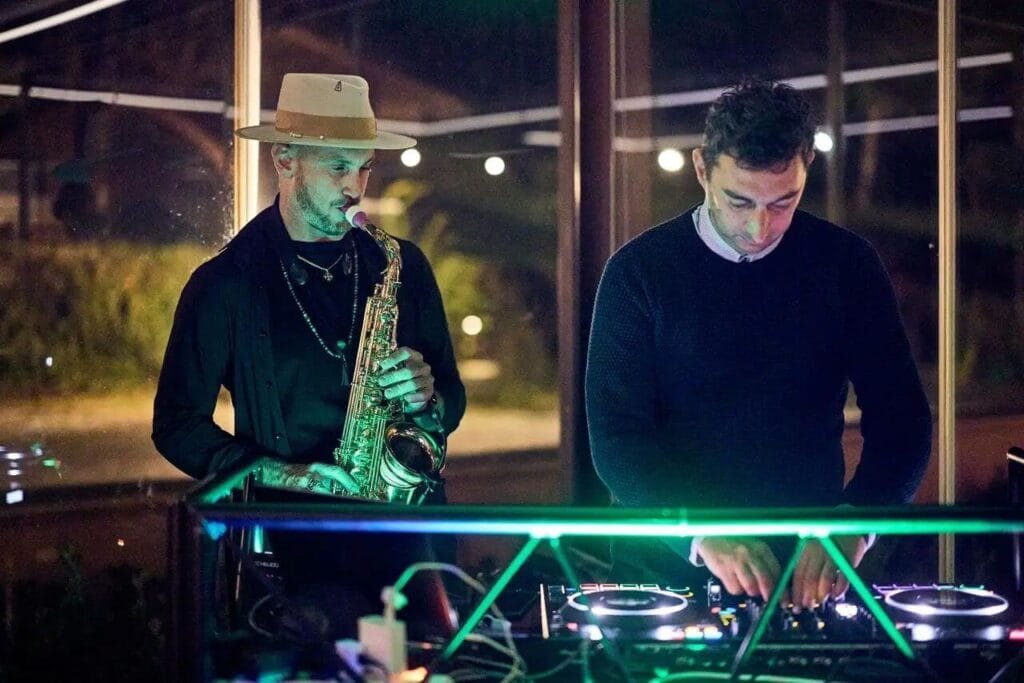
Pro tip:
The use of backing vocals is underestimated. The magic of two vocalists creating harmonies is like having additional band members. People always talk about the “duo with great vocals”. Remember, the main vocal in your duo is the main instrument; it should be the best you can get.
When should you choose a duo format for events?
1. Budget-friendly alternative to a full band
Many people choose to have a small wedding to cut costs, and the band is a significant part of it. The same goes for public venues, which are also cutting costs as much as possible.
2. Small or noise-sensitive venues
If you have the opportunity to play in small bars frequently, a music duo act is a smart choice. Small bars and restaurants don’t book full bands often, so this might be the best choice for you.
3. Health conditions
This may not be the first thing someone would consider, but for musicians with health problems, playing in a duo is usually easier than in a full band. A guitarist in a band needs to carry much more equipment (guitar, pedalboard, amplifier, and larger PA) than when playing solely an acoustic guitar.
Older musicians can also benefit from playing in a duo. Less gear, faster setup time, and easier transport can reduce fatigue significantly. Also, duo gigs are easier to find and can mean less traveling.
4. Events that need a flexible musical act
Corporate events and weddings may need live music more than once, and in different locations during their event. A musical duo is easy to move and can play acoustically when needed and with a PA.
5. Intimate and romantic events
Events like weddings or cocktail receptions usually don’t need high-energy performances. A musical duo is perfect for many types of events. During the wedding ceremony, a piano and a violin may be the best combination, but afterwards, when the party starts, these two musicians can continue to play, but with a full band.
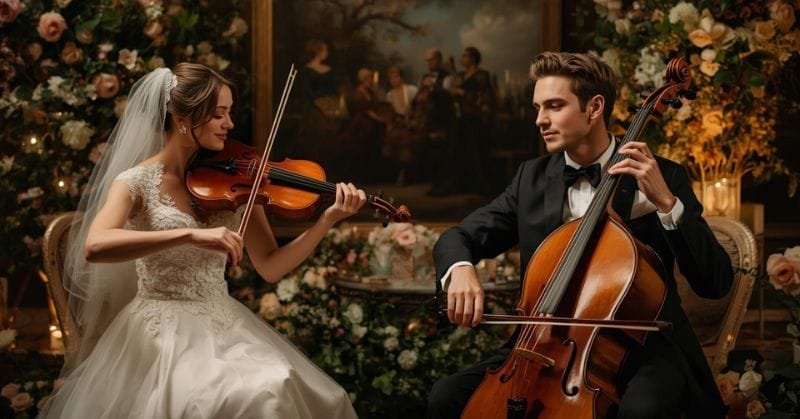
What duo format is right for you?
These are the main factors to consider when choosing the right duo format for you:
1. Your target market
What the people who are organizing a wedding want you to play can vary greatly. Your repertoire and ability to adapt quickly to new songs must be highly professional. But if you are aiming to play at local bars and restaurants, you can manage with a smaller set of songs and a more “niche” act.
2. Your geographic market
Do some research on what types of duos are most active in your area. Maybe there is a shortage of a type of duo.
3. Your health condition
Playing gigs for a long time can be tough if you are the only main vocalist. Consider a duo with two main vocals or an instrumental duo if that is something you can do.
4. Your musical strengths
What are you best at? Can you sing at all? If your guitar playing is exceptional, but you don’t sing, you could use either a fantastic vocalist or perhaps one more top-level guitarist for an instrumental duo. Whatever you decide, always play the instrument that you play best.
Final thoughts
The musical duo format is one of the best approaches to professional gigging. There is much more going on than when playing solo, and it is easier to manage than a full band. Flexibility, ease of transport, and faster setups are huge advantages. If you consider that a musical duo is much cheaper to book and can play almost any venue due to its size, you might have the best formula for success in the gigging industry.
Make your duo work for you, showcase your strengths. The combination you choose might work for a while, but still, be open-minded to new opportunities. Like any other business, treat your music business the same way. Managing a duo is no different than any other act. Branding and networking should be an ongoing process. The duos that get booked the most aren’t always the best musicians, but they do their job the best.
Now is the perfect time to get started with a music duo act. Start, and as time goes by, you will get better and better!

